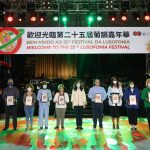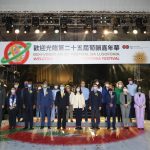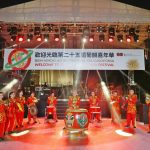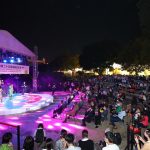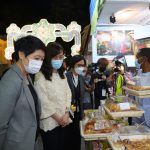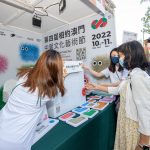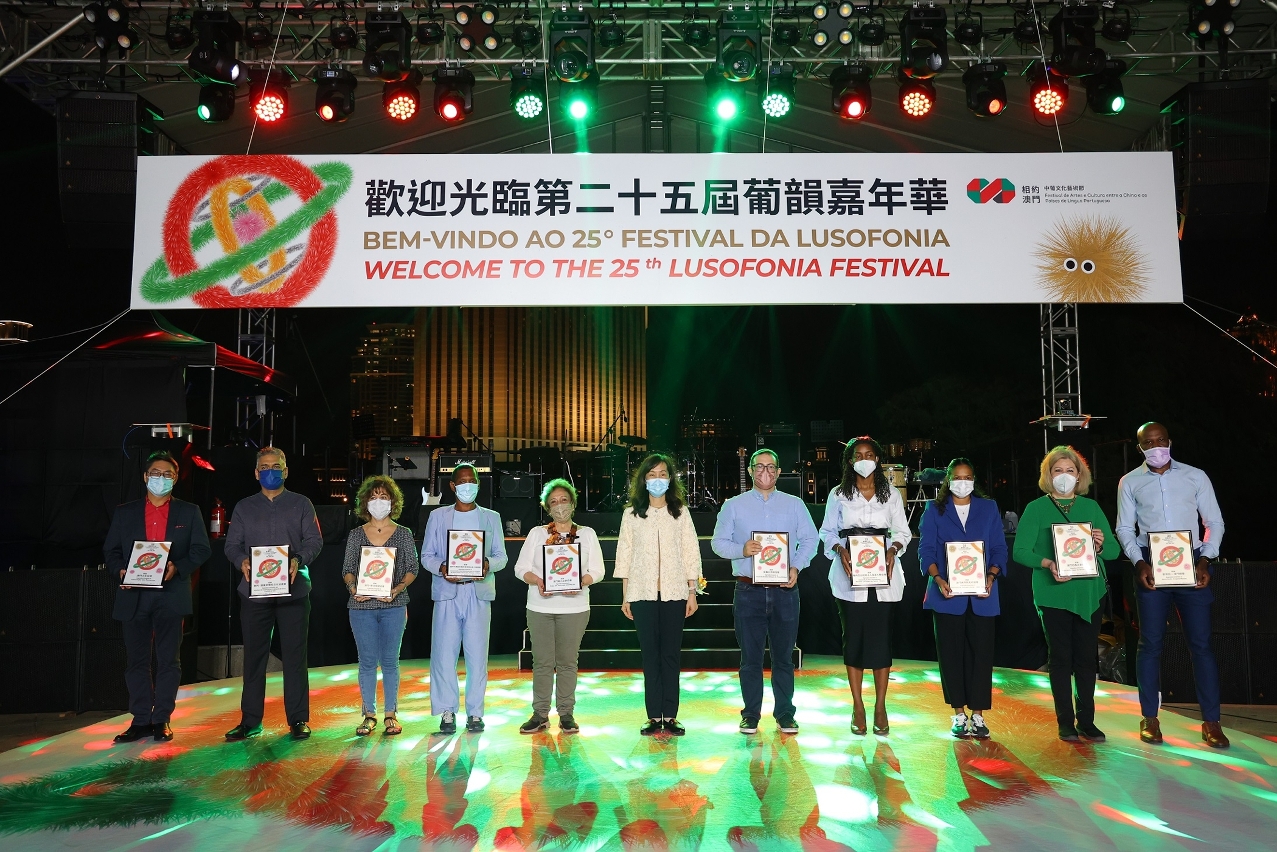 The Secretary for Social Affairs and Culture, Ao Ieong U presents certificates of appreciation to the representatives of the ten countries or regions of Macao
The Secretary for Social Affairs and Culture, Ao Ieong U presents certificates of appreciation to the representatives of the ten countries or regions of Macao
Under the patronage of the Secretariat for Social Affairs and Culture of the Macao SAR Government, organised by the Cultural Affairs Bureau and supported by the Macao Government Tourism Office, Municipal Affairs Bureau, TDM - Teledifusão de Macau, S.A. and the Macao Institute for Tourism Studies, the 4th “Encounter in Macao – Arts and Cultural Festival between China and Portuguese-speaking Countries” is held concurrently with the 25th Lusofonia Festival, featuring the “China and Portuguese-speaking Countries Film Festival”, the “Traditional Music and Dance Performance in the Community” and the “Chinese and Portuguese Picture Book Fair”, seeking to create a theme park of Sino-Portuguese cultural encounter in areas near the Taipa Houses and the Carmo Hall, and to offer unique multicultural experiences to residents and tourists.
The opening ceremony of the 4th “Encounter in Macao – Arts and Cultural Festival between China and Portuguese-speaking Countries” and the 25th Lusofonia Festival was held on 28 October at the Amphitheatre of Taipa Houses and was officiated by the Secretary for Social Affairs and Culture, Ao Ieong U; the Deputy Commissioner of the Ministry of Foreign Affairs of the People’s Republic of China in the Macao SAR, Sun Xiangyang; the Deputy Director of the Department of Publicity and Culture of the Liaison Office of the Central People's Government in the Macao SAR, Yin Rutao; the Consul-General of the Republic of Angola in the Macao SAR, Eduardo Velasco Galiano; the Counselor of the Consulate General of Portugal in Macao, Manuel Ricardo Silva; the Advisor of the Consulate General of Mozambique in the Macao SAR, Aurélio de Jesus Chiconela; the President of the Cultural Affairs Bureau, Leong Wai Man; the Director of the Macao Government Tourism Office, Maria Helena de Senna Fernandes; the Chairman of the Executive Committee of Teledifusão de Macau, S.A., Lo Song Man; the Vice President of the Administration Committee on Municipal Affairs of the Municipal Affairs Bureau, Lo Chi Kin; the Vice-President of the Institute for Tourism Studies of Macao, Loi Kim Ieng; and was attended by the Chief of Office of the Secretary for Social Affairs and Culture of the Macao SAR Government, Ho Ioc San; the Vice President of the Cultural Affairs Bureau, Cheong Lai San; the Deputy Director-General of the Shenzhen Municipal Bureau of Culture, Sports, Tourism and Radio, Television, Ding Zhongyuan; and representatives of various cooperative entities.
The 25th Lusofonia Festival will be held from 28 to 30 October, at the Taipa Houses. This year's event will focus on Macao's Macanese culture, including Macanese Gastronomy and Handicraft Exhibitions, and will showcase the culture of each of the local Portuguese-speaking communities through their respective stands, music and dance performances, typical cuisine, games, amongst other contents with characteristics of the Portuguese-speaking countries.
The first edition of the Lusofonia Festival was held in 1998 and over the years it has become an important event to share the culture of the Portuguese-speaking communities, showcasing Macao’s role as a platform of cultural exchange between China and the Portuguese-speaking countries, marking its 25th anniversary (Silver Jubilee). Starting this year, each edition will focus on the promotion of the characteristic culture of one of the participating Portuguese-speaking communities or regions. This year, the focus will be on Macanese culture, with emphasis on the Macanese Gastronomy and Handicraft Shows. Citizens and tourists can taste a variety of Macanese dishes, such as Pork Minchi, Cabbage Trouxas, Chicken Chau-Chau Parida amongst other famous Macanese dishes in Macau.
A three-day event, featuring ten countries or regions of Macao Portuguese-speaking communities, namely Angola, Brazil, Cape Verde, Guinea-Bissau, Goa, Daman and Diu, Mozambique, Portugal, São Tomé and Príncipe, East Timor and the Macanese community, will be set up, introducing their countries or regions’ traditional music, arts and crafts, costumes, typical drinks, tourist information, amongst others.
In the Festival, the Shenzhen An Zhishun Percussion Art Troupe and around 30 local Portuguese-speaking performing groups will bring to the main stage of the Amphitheatre of Taipa Houses percussion performances, typical songs and dances and also light music on the stage installed in Largo do Carmo, providing a Portuguese touch to the atmosphere. The Festival offers a range of traditional Portuguese games for all age groups in Largo do Carmo on Saturday and Sunday afternoons, namely climbing the slippery pole, wooden ski run, tug of war and amongst others. Table football tournaments will also be featured during the afternoon of Saturdays and Sunday. There will also be a recreational space for children and a radio station, "Radio Carmo", will be installed on site to broadcast Portuguese-speaking countries and regions music throughout the Festival.
In addition, during the dinner period of the three days of the Festival, at Largo do Carmo, dishes from Macao and three Macao Portuguese-speaking countries or regions will be served. The temporary restaurant in the Taipa Municipal Garden will serve Portuguese dishes for dinner and lunch on Saturday and Sunday, including typical Portuguese grilled food and specialties from the participating Portuguese-speaking countries or regions. There will be a temporary kiosk installed on the site will serve typical Portuguese snacks and drinks.
During the event, residents can enter a chance to win film tickets for the opening film of China and Portuguese-speaking Countries Film Festival at designated game booths. Due to the technical reasons, the original opening film In Search of Lost Time will be changed to Hero featuring Zhou Xun, Sammi Cheng, Jackson Yee and Stephen Fung, which tells stories of ordinary people who seek love and hope during difficult times, manifesting the unusual persistence and dedication of ordinary people to life.
The three-day Lusofonia Festival, which includes dances and songs, games, food and multinational flavours, allows the public to experience the splendid and dynamic side of the Portuguese-speaking countries or regions as well as to understand more about the rich cultural heritage of each of them. The event takes place simultaneously with the "Encounter in Macau – Arts and Cultural Festival between China and Portuguese-speaking Countries", featuring a series of activities such as the Chinese and Portuguese Picture Book Fair, outdoor screenings and wine tasting, inviting citizens to come and experience the festive atmosphere of the theme park. The Cultural Affairs Bureau hopes to enrich the cultural tourism experience of citizens and visitors through the Lusofonia Festival and a series of artistic activities, enhancing the effect of the event and creating a Sino-Portuguese cultural experience brand for Macao.
The Cultural Affairs Bureau will strictly follow the relevant epidemic prevention guidelines of the Health Bureau and make proper arrangements for art and cultural activities. Participants must wear their own face masks, will be measured their body temperature, show the personal health code of the day and cooperate with relevant epidemic prevention measures.
For more information, please visit the "Encounter in Macau – Arts and Cultural Festival between China and Portuguese-speaking Countries" website www.icm.gov.mo/FCP, Facebook page “ IC Art” or WeChat page “IC do Instituto Cultural de Macau”.


